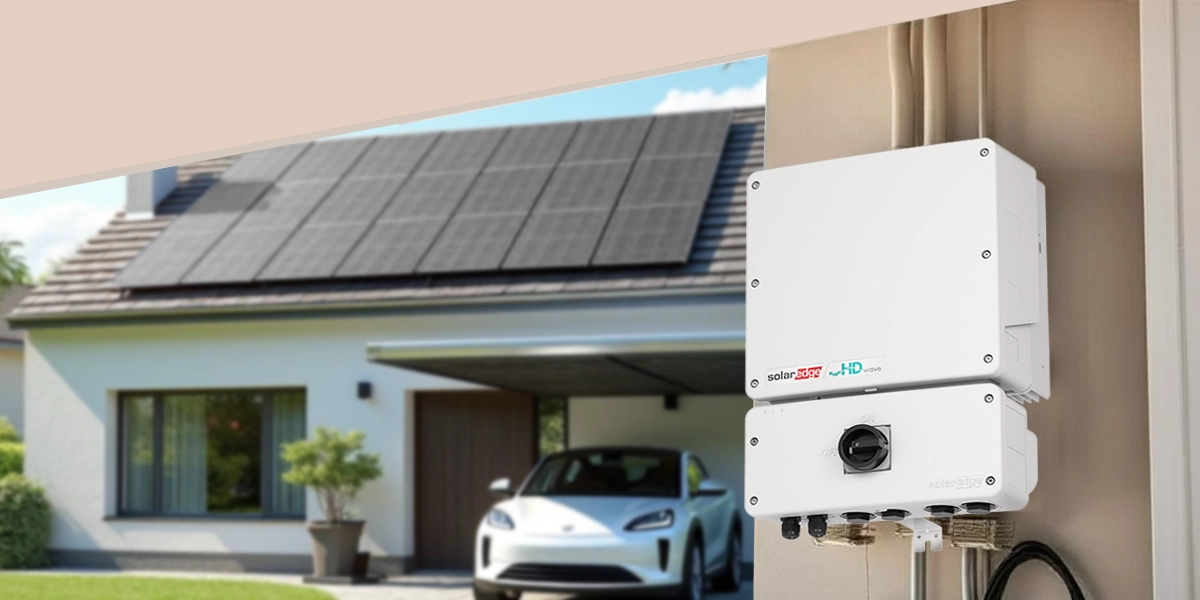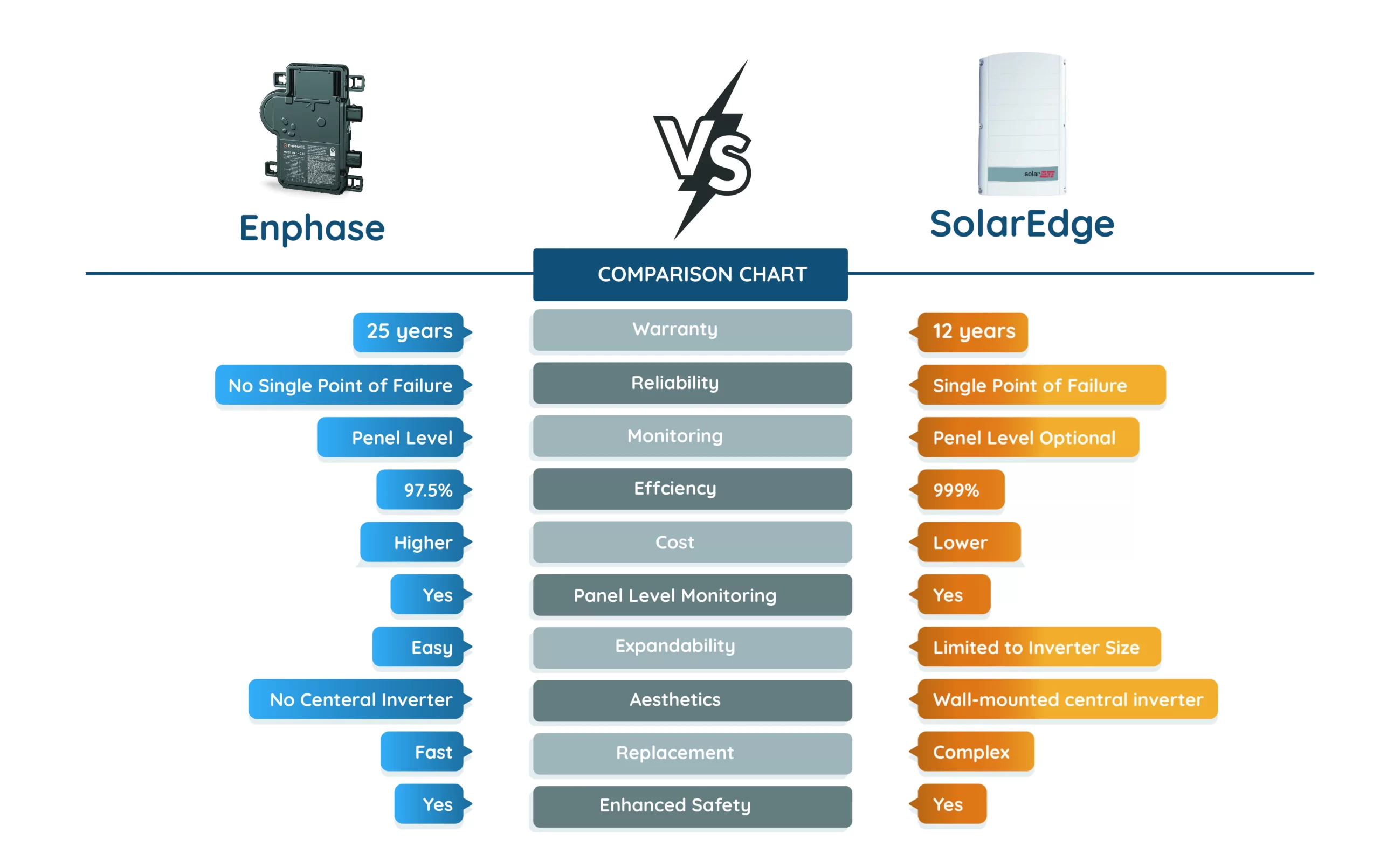- Updated On: March 13, 2025
Microinverters: What You Need to Know in 2025?
Micro inverters have emerged as a game-changing technology, revolutionizing the working of photovoltaic systems. Every solar panel system requires inverters. They convert the DC power generated from your panels into an alternating current (AC) to power your home. Among all types of inverters, microinverters stand out as the most popular due to their compliance with safety regulations and the National Electrical Code. They are available in various sizes and shapes and help to enhance your system performance more efficiently.
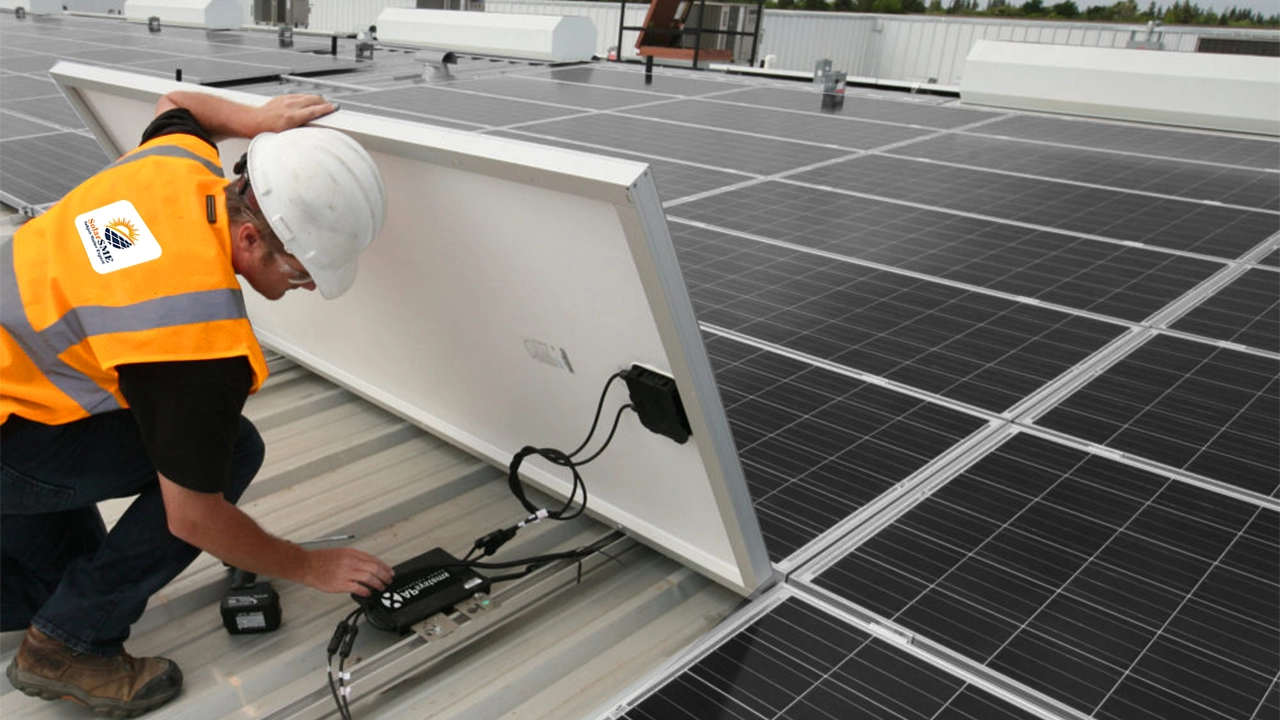
You will learn in this article about how microinverters are different from traditional inverters and tips to evaluate a good microinverter for your solar energy system.
What are solar microinverters?
Microinverters function on a single panel’s level, unlike string inverters that link several panels to one inverter. In a PV system, every panel has a microinverter. These inverters can optimize the conversion process to boost the efficiency of your home solar system. They play a pivotal role in a system as they transform DC into usable electricity (AC) for powering home devices. For complex solar installations with multiple roof orientations, microinverters work well.
How do micro inverters work?
To maximize the power it receives and produces, each microinverter uses power point tracking. The DC power is converted into AC power using the data from the power point tracking. The motion of DC and AC electricity differs. AC electricity flows like a sequence of waves, and DC electricity as a straight line. A “wavy” line is created from this straight line by the microinverter. A technique called pulse width modulation (PWM), which converts direct current (DC) electricity into an alternating current (AC) waveform, is used to do this. It essentially changes DC to resemble the waveform of AC electricity.
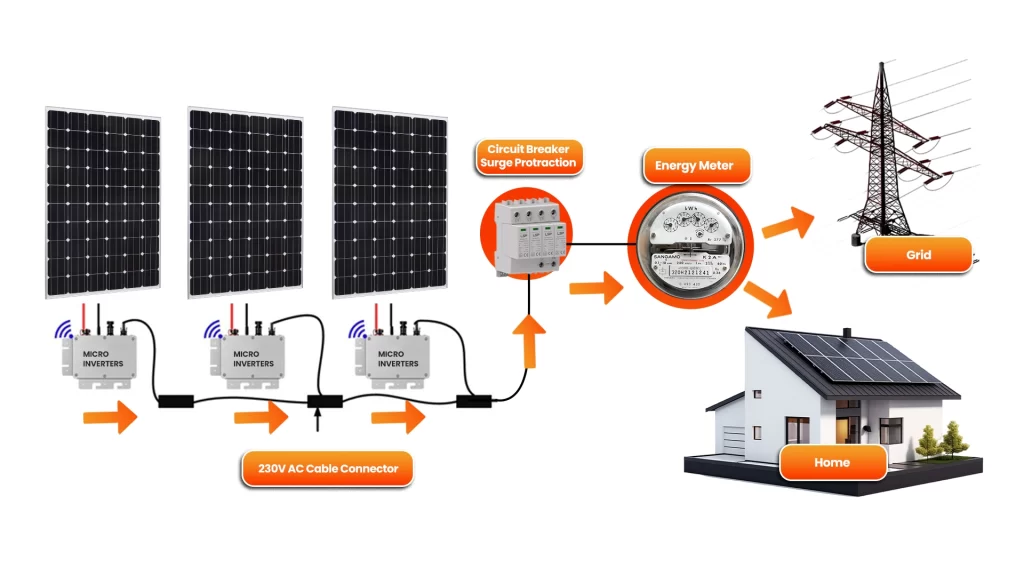
Since the microinverter’s final output is in waveforms, the procedure starts with a reference signal. After that, the microinverter compares the DC electricity it gets with this reference signal. It produces an error signal when it finds a difference between the two. The microinverter reacts by identifying the discrepancy and starting the necessary corrections to align the signals. The DC frequency then changes by high-frequency pulses produced by the microinverter. It is tuned to provide a smooth wave signal that corresponds to the grid’s reference signal. The AC electricity generated by the microinverter must be in sync with the grid’s AC frequency and phase.
What are the pros and cons of microinverters?
Every residential solar panel system needs inverters to work. But the right one for you depends on the system’s design. Let’s discuss some of the benefits and drawbacks in detail:
Pros
For solar customers, microinverters are a great investment, particularly if your roof is partially shaded or complex. Power optimizers are not necessary for rapid shutdown compliance and optimization with microinverters because they function at the panel level. Only the panel connected to a single microinverter will shut down if there is a problem with it; the system as a whole will not.
Over time, you can increase the number of microinverters if you plan to upgrade your solar system. Suppose that in the future, your energy needs will rise. Instead of matching a central solar inverter‘s power output to your new system size, you can use microinverters to add more panels. You can expect a longer lifespan because the microinverter guarantee is often for the same time as the connected panels (usually 25 years).
Cons
Although microinverters may improve system performance, they cost more than string inverters. Additionally, microinverters are installed on your roof with panels, which makes maintenance more challenging (and expensive if work is not covered by your guarantee).
Also, when looking for a solar panel system, clipping is an important consideration. It refers to power losses linked to microinverters. Your microinverter’s power output rating is often less than the panel’s. Clipping happens when your solar panel generates more electricity than its micro inverter can convert at one time, preventing your system from utilizing your panel’s full power output.
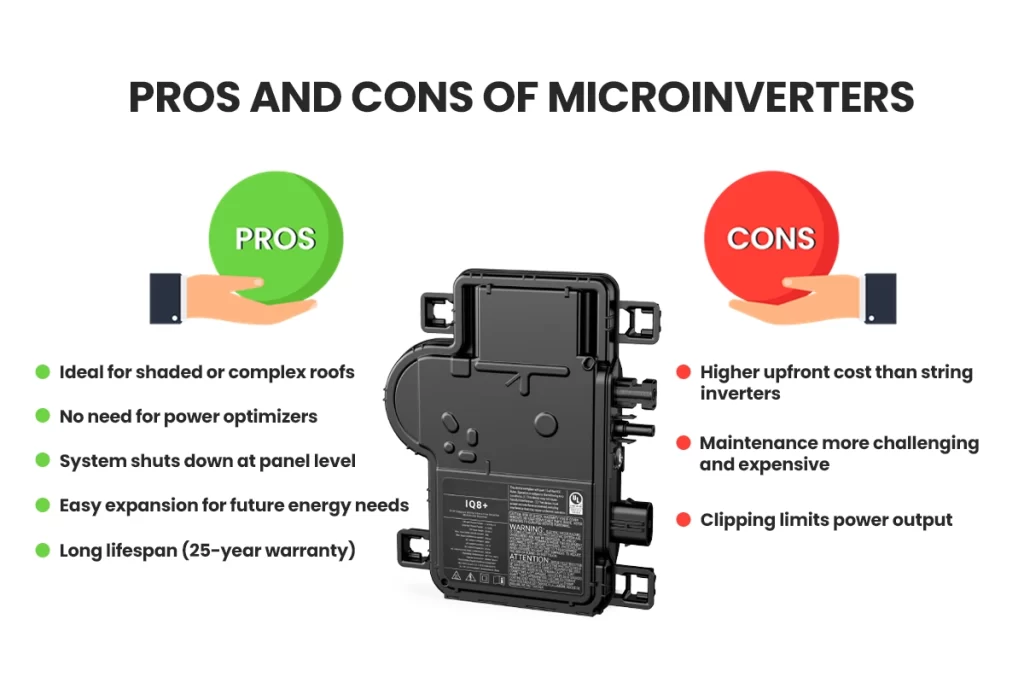
How do microinverters compare to other types of solar inverters?
String Inverters VS. Microinverters
The primary distinction between string and microinverters is wiring. You only need to utilize one or two string inverters to wire your solar panels, depending on how big your system is. Often, microinverters are connected to a single panel. Also, string inverters are cheaper to install and maintain than microinverters.

Power Optimizers VS. Microinverters
Power optimizers do not instantly change direct currents to alternating currents as micro and string inverters do. They “condition” it instead, then send it to a central inverter. The ability to monitor the performance of individual solar panels and flexibility when designing a solar system makes these module-level power electronics (MLPEs) similar to microinverters.

What are the factors to analyze a microinverter?
While comparing different inverters, the factors you should keep in mind include
Efficiency:
The efficiency of microinverters varies like solar panels. Energy losses during the conversion of DC to AC electricity reflect the inverter’s efficiency. Efficient inverters produce more power. Although efficiency rates are often calculated under optimal conditions, the actual efficiency depends on factors like weather and climate. You can level your expectations for a microinverter’s performance by using weighted efficiency ratings.
Size
Microinverters cope with various types of electrical voltages and are available in a variety of sizes. Avoid excessive clipping and install a microinverter that is a manageable size for the energy output of the related panel.
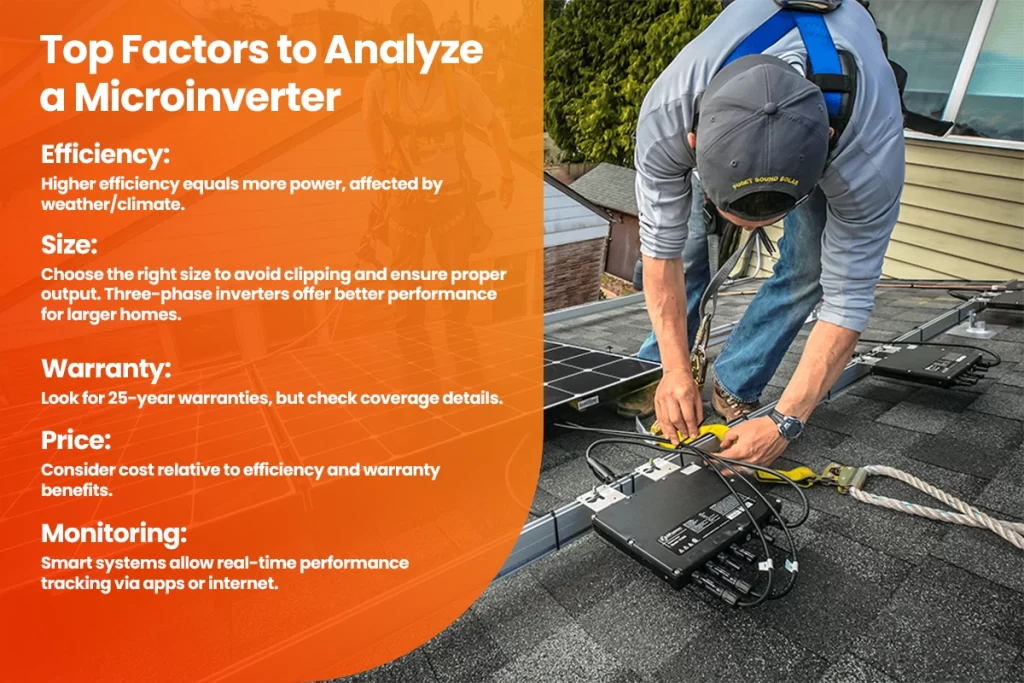
The terms “single-phase” and “three-phase” may likely come up while you look through your microinverter options. In a single-phase system, electricity flows via one active wire; in a three-phase system, it flows through three active wires. This is the way power is distributed in a microinverter. Three-phase micro inverters can improve performance and transmit more power than single-phase microinverters, which are often cheaper and compatible with many home solar panel installations. Big homes with higher energy needs might benefit from a three-phase microinverter.
Warranty
Microinverters in the market often come with a 25-year guarantee, which protects against probable manufacturing flaws or excessive degradation. Reading and comparing warranty agreements is important when selecting solar equipment, even if it might be time-consuming. Although the warranty period may be the same for all microinverter manufacturers, the coverage levels may vary.
Price
Microinverters are not usually the costly component of a solar panel system, but it’s still vital to consider the cost. Depending on your preferences and system configuration, greater efficiency microinverters with longer warranties may be worth more.
Monitoring
Nowadays, microinverters come with smart monitoring systems that allow you to control your appliances and get real-time system performance updates. While some companies provide this data through apps, others make it available on any device with an internet connection.
In conclusion, micro inverters are a good choice for your home if your system design is more complex, like if you have panels on multiple roof planes. Additionally, you should use microinverters if your panels are partially shaded during the day. Although they may cost you a little more, you will pocket more savings by maximizing each panel’s power production. Moreover, we suggest you consult with a trusted solar installation company near you like Solar SME for the best options. You can Schedule a FREE Appointment with our energy experts today!
Related Articles:
Maybe you’ve heard of solar panel kits, but you don’t know exactly what they are and how they’re different from solar installations. Well, they are, kind of. Here’s what you need to know about solar panel kits.
Solar Inverters are the brains of solar PV systems. Several types of solar inverters are available on the market. If you are concerned about what size inverter you need, this article is for you. Learn about some tips of inverter sizing for maximum performance.
For your home or business, selecting a solar inverter can be challenging. The two major companies in the solar inverter industry are SolarEdge and Enphase.


